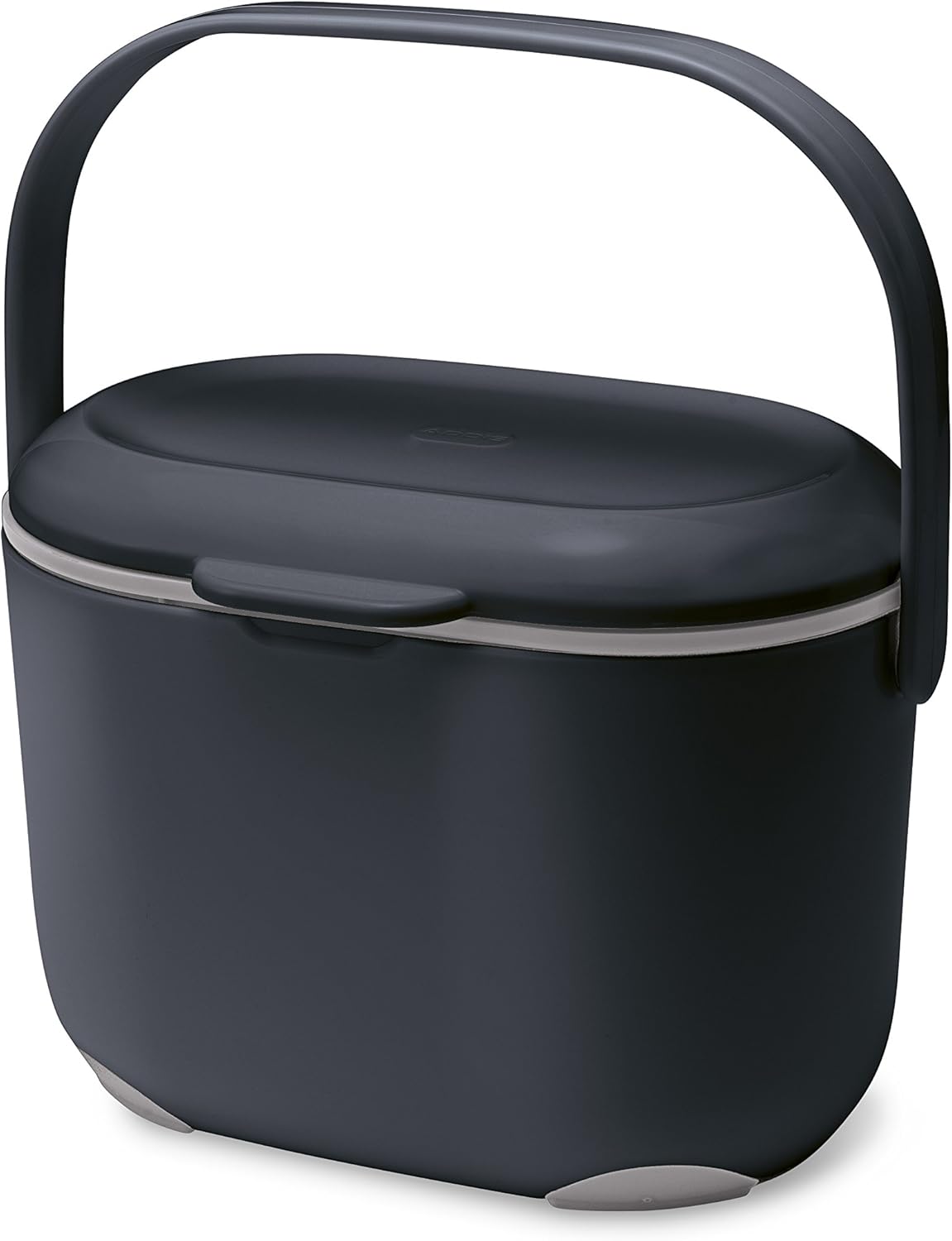Table of Contents
Think reducing your environmental footprint means big changes? Think again. Composting offers a simple yet powerful way to make a positive impact. Food waste is a huge problem—tons of kitchen scraps end up in landfills, rotting and releasing harmful methane gas. Composting turns that waste into rich soil, reducing greenhouse gases and enriching gardens and farms.
A countertop composting bin (affiliate link) makes composting convenient and stylish. Imagine a sleek, modern bin fitting perfectly on your kitchen counter, ready to collect those vegetable peels, coffee grounds, and more. No need to run outside every time you have waste to dispose of. A well-designed bin keeps your kitchen neat and free from the usual trash bin odours. It’s a practical addition to any eco-conscious home.
You’ll find these bins in various designs and sizes, with features like charcoal filters to keep odours in check and easy-clean materials so that maintenance is a breeze. Whether you’re an apartment dweller with limited space or a homeowner looking to upgrade your kitchen’s green credentials, there’s a composting bin that fits your needs perfectly.
Why choose a kitchen composting bin?
- Kitchen composting bins offer a great way to handle food waste right where it’s produced. Think about it—no more running outside to the compost pile every time you peel a carrot or make a cup of coffee. It’s all about convenience.
- composting bins significantly reduce the amount of trash you throw away. Food waste takes up a lot of space in landfills, and as it breaks down, it releases methane, a potent greenhouse gas. By composting, you are diverting waste from landfills and helping fight climate change.
- Having a compost bin on your countertop means it’s always accessible. You’re more likely to use it because it’s right there when you need it. No need to make an extra trip outside, which makes the whole composting process seamless and integrated into your daily routine. It’s the kind of setup that turns a green initiative into a practical habit.
Features of the countertop composting bin
When picking a countertop composting bin, some key features really make a difference.
- First up, design and size. You want something compact that doesn’t hog your counter space. The good news is, there are plenty of stylish options that blend right into any kitchen decor.
- Odour control is a big deal. The best bins come with tight-fitting lids and charcoal filters that trap smells, so you don’t have to worry about stinky kitchen scraps. These features are game changers, keeping your kitchen smelling fresh as ever.
- Cleaning your composting bin shouldn’t be a hassle. Look for bins made from materials like stainless steel (affiliate link) or high-quality plastic (affiliate link). These are easy to wipe down or rinse out, keeping maintenance super simple. Some even have removable parts that make cleaning a breeze.
All these features combined make for a composting bin that’s both functional and easy to live with. It’s all about making eco-friendly choices that fit seamlessly into your lifestyle.
How to use your kitchen compost bin
Knowing what you can and can’t compost is step one. Stick to kitchen scraps like fruits, veggies, coffee grounds, eggshells, and tea bags. These are gold for composting. Avoid meat, dairy, and oily foods—they can attract pests and create unpleasant odours.
Keeping your bin effective takes just a little bit of care. Empty it regularly into your main compost pile or composting service. Give it a quick rinse or wipe down each time you empty it to keep things clean and prevent odour buildup. If your bin uses charcoal filters, change them as recommended—usually every few months.
Adding a bit of shredded paper or cardboard to your compost bin can help with odour control and balance the ‘greens’ and ‘browns’ needed for efficient composting. And always make sure the lid is on tight to keep any unwanted pests away.
Benefits to your household and beyond
Using a kitchen composting bin does wonders for your home and the environment.
- One of the most immediate benefits is improved trash odour. With less food waste sitting in your regular trash can, your kitchen will smell much fresher.
- Another fantastic perk is enriching your soil. If you’re into gardening, homemade compost can transform your plants. It’s rich in nutrients, giving your flowers, veggies, and herbs a healthy boost. Even if you don’t garden, local community gardens or farmers can benefit from the compost you generate.
- Composting also reduces the trash you produce. Less waste means fewer garbage bags and fewer trips to the curb. Plus, you’re playing a part in reducing landfill waste and lowering greenhouse gas emissions. It’s a small step that makes a big difference.
Embracing a countertop composting bin (affiliate link) is about creating a more sustainable lifestyle. It’s an easy way to turn something as simple as kitchen scraps into something valuable and impactful.
Choosing the right compostable materials
Understanding what you can and can’t toss into your compost bin is the key to effective composting.
- Stick to fruit and veggie scraps, coffee grounds, eggshells, and tea bags. These break down well and add valuable nutrients to your compost.
- Avoid composting meat, dairy products, and oily foods. They can create odours and attract pests, not to mention they take longer to decompose properly.
- It’s also a good idea to skip composting any diseased plants or chemically treated yard waste, as these can introduce harmful elements to your compost.
- Paper products are generally okay too. Shredded newspaper, paper towels, and napkins can help add balance to your compost’s green-brown ratio. Just be mindful to avoid glossy paper or anything with heavy inks and dyes.
Overcoming common challenges
A few drawbacks come with composting, but they’re easy to manage with the right approach.
Odours can be off-putting but are usually a sign something’s off balance. Regularly cleaning your bin and ensuring it’s not overloaded helps. Adding more dry materials like shredded paper can also keep smells at bay. Another tip: charcoal filters are your best friend for controlling odours.
Pests like fruit flies might pop up. Make sure you’re using a tight-fitting lid and emptying your bin often. If possible, store food scraps in the freezer until you’re ready to compost them to avoid attracting pests.
Moisture levels are another thing to watch. Too much moisture can make your compost a soggy mess, while too little can slow down the composting process. Keep it balanced by adding dry materials like leaves or paper and mixing your compost regularly.
Conclusion: Make the switch today!
Switching to a countertop composting bin (affiliate link) is a straightforward way to make your kitchen greener and your lifestyle more sustainable. Think about the benefits: reducing landfill waste, enriching soil, and eliminating kitchen odours. With a compost bin that’s convenient and stylish, it’s easier than ever to integrate eco-friendly habits into your daily routine.
(As an Amazon Associate, I earn from qualifying purchases)
Kay,
greenlifehub.com

